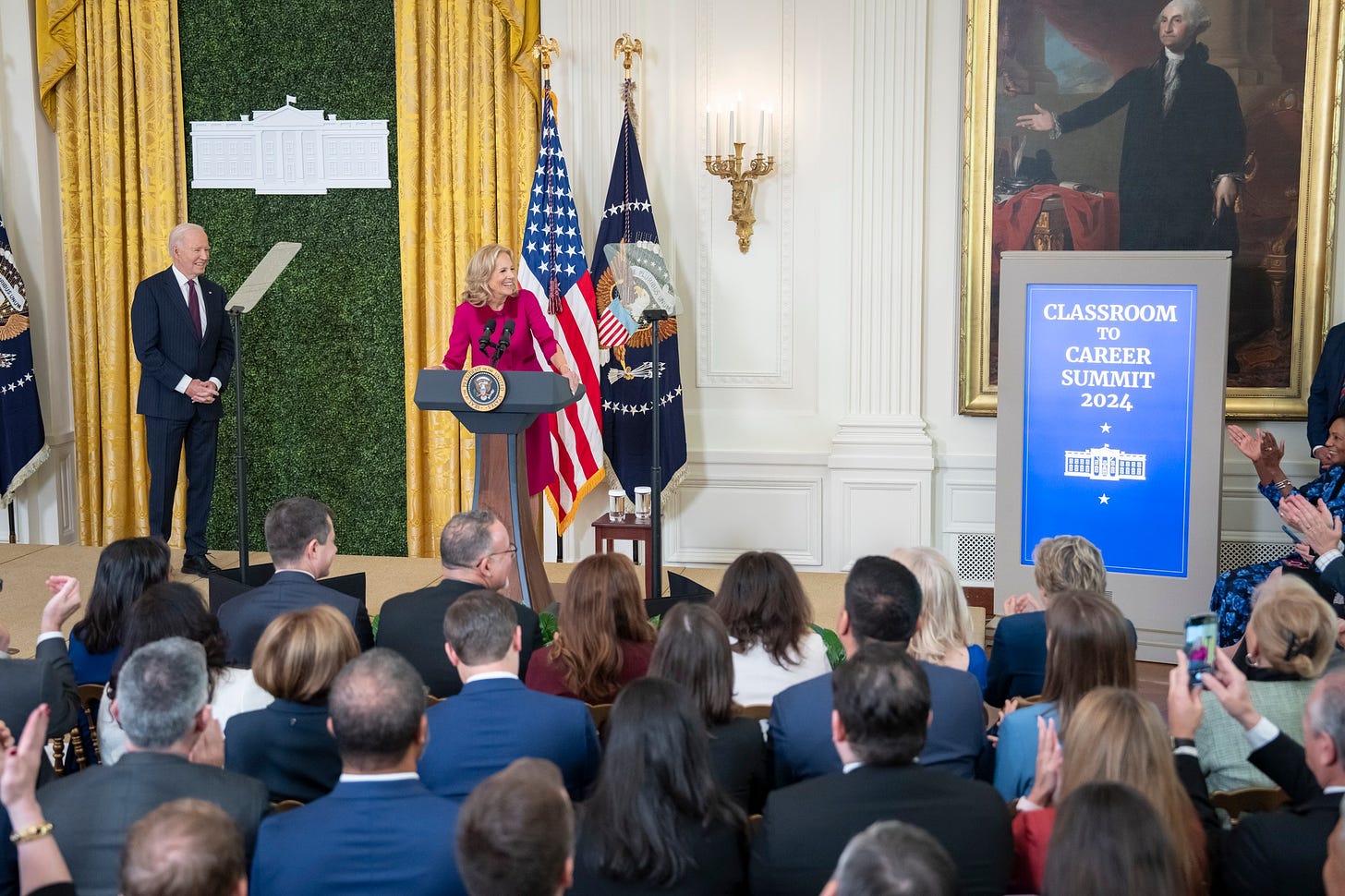The Biden-Harris Administration's "Classroom to Career" Summit at the White House, hosted by President Biden and First Lady Dr. Jill Biden, gathered around 200 leaders in education and workforce development to advance pathways from education to well-paying jobs. This Summit was part of the Investing in America agenda, which has created millions of jobs, including roles in infrastructure, clean energy, and advanced manufacturing that do not require four-year degrees. President Biden announced that over $80 billion from the American Rescue Plan had been committed to strengthening workforce development through community college programs, Registered Apprenticeships, and initiatives to foster a diverse workforce across critical industries.
One of the key focuses of the Summit was expanding community colleges and Career Technical Education (CTE). The First Lady revealed that 34 states and Washington, D.C., now offer tuition-free community college programs. The Department of Education introduced new tools to connect students to high-paying career paths tied to the Investing in America agenda. Additionally, the Department of Commerce allocated over $300 million for workforce training related to broadband expansion, and more than 80 community colleges launched semiconductor job training programs funded by the CHIPS Act.
The Summit also highlighted support for students in financial distress and other new workforce initiatives. Foundations announced plans for a national emergency aid program to support financially struggling students, including single mothers, in 2025. YouthBuild committed to expanding its solar training program, and 20 community colleges were set to develop Registered Apprenticeships in non-traditional fields. The Department of Labor reported that over one million Americans had entered Registered Apprenticeships since the start of the Biden administration, with the number of women participants surpassing 100,000 for the first time.
The Administration further promoted skills-based hiring, with federal agencies transitioning to assess candidates based on skills rather than degrees. The Department of Energy, for example, planned to remove degree requirements for cybersecurity and IT positions by the end of 2024. Additionally, the Summit showcased progress within the White House Workforce Hubs across nine U.S. regions, where the Administration supported community-driven training programs to address local labor demands in fields such as clean energy, semiconductor manufacturing, and infrastructure.
The Summit underscored the Administration’s commitment to equitable workforce development and prioritizing skills over formal degrees, aligning educational pathways with the dynamic needs of America's evolving economy.
In his remarks at COP29, Senior Advisor John Podesta, representing President Biden, highlighted the urgent need for climate action to avoid dire consequences, emphasizing that 2024 will be the hottest year on record. He underscored the devastating impacts of climate change, such as hurricanes in the U.S., drought-induced starvation in southern Africa, and flooding in Colombia, demonstrating the need for immediate and effective measures.
Podesta affirmed the Biden administration's significant investments in decarbonization, bolstered by the Inflation Reduction Act, and reiterated the U.S. commitment to meet an $11 billion annual climate finance goal by the end of 2024. He outlined key priorities for COP29, including finalizing critical negotiations, setting ambitious and achievable financial goals for developing countries, and advancing a new climate finance framework to support sustainable economies.
He called on major economies to submit their 2035 Nationally Determined Contributions (NDCs) aligned with the 1.5°C target, complete Biennial Transparency Reports by the end of the year, and support initiatives outside the Paris Agreement. Podesta concluded by urging countries to choose a safer, cleaner future through decisive climate action.
National Economic Advisor Lael Brainard addressed the latest Consumer Price Index (CPI) report, noting that inflation for October stands at 2.6%, a rate close to pre-pandemic levels. She emphasized this progress as a "hard-fought recovery," highlighting recent achievements directly impacting American families' cost of living. According to Brainard, gas prices have fallen to an average of $3.08 per gallon, while insulin prices for seniors, previously as high as $400 per month, are now capped at $35 monthly. Additionally, household incomes have grown by $4,000 during this Administration, outpacing increases in consumer prices and providing families with greater financial stability.
Brainard further stressed that the Administration remains committed to lowering costs on essential items, specifically pointing to housing and healthcare as focus areas. This ongoing commitment, she indicated, is critical to ensure that the gains in inflation reduction translate into broader financial security for working families. She also underscored the Administration's stance against policies that could jeopardize this progress, suggesting that any moves to reverse course on inflation reduction could adversely affect the recent gains made for consumers and families.
National Security Advisor Jake Sullivan shared details on a significant Memorandum of Understanding (MOU) signed between the United States, Canada, and Finland, which focuses on advancing the production of polar icebreakers. Initially announced in July, this agreement aims to strengthen national security by facilitating the development of icebreaking vessels and capabilities needed in polar and Arctic regions. The MOU underscores a commitment from all three nations to keep these regions stable, peaceful, and cooperative, particularly as these areas become increasingly strategic due to shifting geopolitical interests and environmental changes.
Through this partnership, the United States, Canada, and Finland will deepen their collaboration by sharing knowledge, resources, and technical expertise to enhance their collective capabilities in icebreaker production. This cooperation is intended to support a robust, resilient shipbuilding industry that meets national and global needs for these specialized vessels. As these icebreakers are essential for maintaining access and security in icy waters, this MOU marks a critical step in upholding international laws and norms in polar and Arctic regions. Additionally, by building a competitive and sustainable shipbuilding sector, the agreement positions the partner nations to lead in meeting the rising global demand for these crucial maritime assets.
President Biden and President-elect Donald Trump met in the Oval Office to discuss national and international policy issues, marking a shift towards a peaceful transition of power despite their intense history as political rivals. Sitting side by side by the Oval Office fireplace, Biden congratulated Trump on his return to the presidency and emphasized his commitment to ensuring a smooth handover. Trump expressed appreciation, noting that although politics is often challenging and divisive, their meeting reflected a rare moment of unity.
They discussed critical topics such as national security, the Middle East, and Ukraine during their two-hour conversation. Biden, who has long supported providing aid to Ukraine, stressed that helping to maintain stability in Europe is crucial for U.S. security interests. A stable Europe, he argued, prevents America from becoming directly involved in conflicts. Trump, however, reiterated his intention to quickly end the Russia-Ukraine war, although he refrained from sharing specific plans. He later told the New York Post that Biden had shared his views on the Middle East, which Trump appreciated as being “very gracious.”
As part of their meeting, Biden highlighted his priorities for Congress in the lame-duck session, including government funding and additional disaster relief. The meeting also involved senior staff members from both sides, with Biden's chief of staff, Jeff Zients, and Trump’s top aide, Susie Wiles, present. Jill Biden, the First Lady, joined her husband in welcoming Trump, giving him a congratulatory handwritten letter for Melania Trump and signaling her team’s readiness to assist with the transition. Melania, however, chose not to attend the meeting, with her office later posting that she wished Trump success in his transition.
Despite the cooperative atmosphere, the transition is facing challenges. Trump’s team has delayed formal agreements granting access to office space, government equipment, and officials. This delay stems from Trump’s transition lawyers working with Biden’s team to finalize agreements required by the Presidential Transition Act. Valerie Smith Boyd, director of the Center for Presidential Transition, noted the importance of these agreements, which enforce ethical conduct and ensure that only one president governs at a time. Signing this agreement will allow Trump’s team to interact formally with federal agencies, but without it, the transition remains partially stalled.
While the day underscored mutual respect and political civility, the path to a fully operational transition remains contingent on completing formal agreements between the incoming and outgoing administrations.
Additional source: Reuters
Press Secretary Karine Jean-Pierre and National Security Advisor Jake Sullivan held a press briefing outlining President Biden’s recent meeting with President-elect Trump. The meeting included discussions on national security and domestic policy, with Chief of Staff Jeff Zients and incoming Chief of Staff Susie Wiles in attendance. The two leaders covered key issues like congressional funding priorities, the transition of power, and challenges such as U.S. support for Ukraine, competition with China, and Middle Eastern security.
Jake Sullivan provided an overview of Biden’s upcoming trip to South America for the APEC Summit, a historic Amazon visit, and the G20 Summit. The trip will focus on reinforcing alliances, combating climate change, managing relations with China, and addressing global financial and security concerns. Sullivan emphasized bipartisan cooperation in areas like China policy and Ukraine and expressed a willingness to work with the incoming administration on hostages held in Gaza.
During the briefing, Jean-Pierre highlighted the need for a smooth, respectful transition and discussed Biden’s commitment to leading by example, even amid past campaign tensions with President-elect Trump. Key points included Biden’s focus on maintaining alliances, supporting Ukraine, and addressing climate change, all of which focus on continuity in U.S. foreign and domestic policy.
In their remarks at the Classroom to Career Summit, First Lady Dr. Jill Biden and President Joe Biden emphasized their commitment to making education more accessible and career-oriented, focusing on community colleges and pathways to good-paying jobs. Jill Biden reflected on her passion for teaching and her long-standing advocacy for community colleges, which she calls “America’s best-kept secret.” She highlighted efforts to make community colleges tuition-free, noting progress in 34 states and Washington, D.C., while urging continued support for this movement.
President Biden highlighted the administration's focus on building the economy "from the middle out and bottom up," aiming to create more equitable job opportunities. He referenced initiatives under the "Investing in America" agenda, which includes infrastructure improvements, clean energy, and a push to bring manufacturing jobs back to the U.S., especially in areas affected by industrial decline. Notably, Biden pointed out investments in apprenticeships, registered programs for teaching, and a workforce hub model, which aims to match local educational institutions with employer needs. He celebrated milestones, such as the growth in women’s apprenticeships and the expansion of teacher apprenticeships.
Both Bidens emphasized collaboration among unions, businesses, schools, and the government. The president concluded by emphasizing the importance of national unity and continued investment in American workers and families to strengthen the economy.
In a background press call, senior U.S. officials discussed President Biden’s upcoming meeting with Chinese President Xi Jinping at the APEC Summit in Lima, Peru. This meeting marks their third in-person encounter since Biden took office and could potentially be their last as sitting leaders. The central aim is to review progress in managing the complex yet consequential U.S.-China relationship, which the administration has focused on making both stable and competitive. Biden intends to discuss how the U.S. and China can continue responsibly managing competition, avoiding conflicts, and advancing shared interest areas.
Key topics will include maintaining open lines of military communication, which both countries have reestablished over the past year to help prevent misunderstandings and potential conflicts. Biden will also emphasize joint counternarcotics efforts, noting the progress made since last year’s cooperation renewal on combatting synthetic drug trafficking and addressing the fentanyl crisis. Additionally, Biden and Xi have established dialogues around the risks of artificial intelligence (AI) and made strides in climate cooperation, where they have issued joint statements on greenhouse gas reductions and renewable energy.
The President also plans to address several U.S. concerns, including China’s military support for Russia amid its war in Ukraine, increased military activities around Taiwan, and assertive actions in the South China Sea. Biden is also expected to highlight cybersecurity concerns over recent Chinese cyber activities affecting U.S. critical infrastructure and longstanding issues with China’s trade policies that impact American businesses and workers.
While no extensive list of deliverables is expected, Biden’s primary focus will be reviewing and reinforcing existing channels for defense and law enforcement cooperation to ensure stability in the bilateral relationship.
First Lady Dr. Jill Biden, speaking at the PHILADELPHIA250 Countdown to the 250th Gala, celebrated Philadelphia’s role in shaping American democracy. She praised former Governor Edward G. Rendell for his commitment to Pennsylvania. She reflected on her deep connection to the city, recalling how growing up in Philadelphia influenced her perspective on the nation’s history and ideals. Dr. Biden underscored the importance of PHILADELPHIA250’s work to honor and carry forward foundational values like equality and freedom. She highlighted Philadelphia’s enduring spirit, resilience, and influence, describing the city as an ongoing source of inspiration that will continue shaping the nation’s future.
President Biden held a meeting with the families of Americans taken hostage by Hamas, offering an update on the U.S. government’s ongoing efforts to secure the release of these hostages. During the discussion, the President reaffirmed the commitment of his administration to bring the hostages home safely to their families. He expressed empathy for the families’ plight and assured them that the administration has been working tirelessly toward reaching a deal to free their loved ones. Biden emphasized that these efforts are a top priority for the administration and that work will persist to achieve the hostages' safe return. The President’s message aimed to reassure the families that they have the administration's full support in this challenging time.
President Biden and First Lady Dr. Jill Biden host the Classroom to Career Summit at the White House






